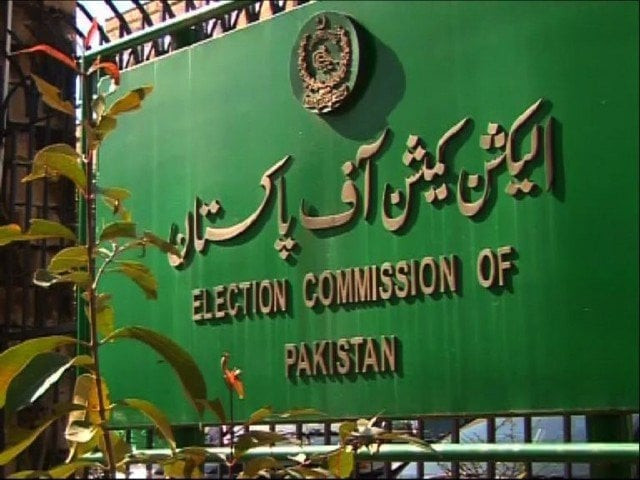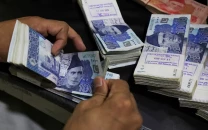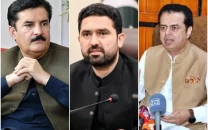SIC not entitled to reserved seats: ECP
ECP told SC that SIC's constitution is violative of articles 17, 20 & 25 of the Constitution

The Election Commission of Pakistan (ECP) has told the Supreme Court that the Sunni Ittehad Council’s (SIC) constitution is violative of articles 17, 20 & 25 of the Constitution and the party is not entitled to any reserved seats for women and in particular for non-Muslims.
“Article 3, Chapter 1, of the Constitution of the SIC restricts membership of the SIC to only adult Muslims, and places further three other conditions of a like nature to membership.
“The conditions in said Article 3 of SIC’s Constitution are violative of Articles 17, 20 and 25 of the Constitution, in view thereof, SIC clearly is not entitled to any reserved seats for women and in particular for non-Muslims,” the ECP said in, a concise statement submitted to the to court.
A full-bench of the Supreme Court is going to resume hearing a petition tomorrow (Monday) filed by the SIC—which primarily comprises PTI-backed independent lawmakers—regarding allocation of reserved seats in the parliament and provincial legislatures.
The ECP on December 22, 2023 stripped the PTI of its election symbol in view of irregularities in its intra-party polls. The Supreme Court on January 13 upheld the ECP order, forcing the PTI candidates to contest the February 8 general elections as independents.
The independent candidates joined the SIC after the announcement of official election results. The SIC later sought reserved seats in the parliament and provincial assemblies in proportion to its general seats.
However, the ECP on March 1 refused to allot these reserved seats to the SIC. The Peshawar High Court (PHC) on March 25 also upheld the ECP order, prompting the SIC to approach the apex court.
In its reply, the ECP stated that the SIC is clearly not eligible for reserved seats for women and non-Muslims on account of its not being a “political party” within the meaning of Article 51(6)(d), 56(6)(e) and 106(3)(c) of the Constitution.
A “political party” within the contemplation of Articles 51(6)(d), 51(6)(e) and 106(3)(c) is an entity which is “enlisted” as a political party under the Elections Act, 2017.
“Secondly, it applied for and was allotted a common election symbol to field its “party affiliation certificate” holders to contest on general seats in a general election and thirdly, it fielded one or more candidates to contest on a general seat in a general election and its candidate(s) formally.
“Accordingly, the order dated March 1 of the ECP as well as the impugned judgment dated March 25 of the PHC are correct and do not suffer from any error or infirmity,” it said.
It said a “political party” comprised only of “independent candidates” who joined such political party pursuant to the proviso of Articles 51(6)(d), 51(6)(e) and 106(3)(c) of the Constitution read with Rule 92(6) of the Election Rules is not a “political party” within the contemplation and scope of Article 51(6)(d), 51(6)(e) and 106(3)(c)”
The reply said the scheme of the Constitution and the Elections Act, 2017 envisage and recognize only three classes of “contesting candidates” in General Elections.
These include candidates contesting on general seats under a common election symbol; candidates contesting elections on general seats as “Independent Candidates” (allotted symbol from the pool for Independent Candidates) and candidates contesting elections on reserved seats for women or for non-Muslims.
“The scheme of the Constitution and the Elections Act, 2017 does not envisage nor recognize any so-called “class” of “X-Party Backed Candidates” (in this case “PTI-Backed Independents”, a term coined by the media) contesting candidates in general elections.
“The moment a candidate contesting for a general seat fails to submit a ‘Party Affiliation Certificate’ for allotment by the returning officer of the common election symbol of the relevant political party within the period prescribed by the ECP in the Election Programme, such candidate losses all the characteristics of being a ‘member’ of such ‘enlisted contesting political party’.”
It said this is a fundamental feature of the scheme of the Constitution and Elections Act, 2017 and there are no bases for reading in or creating any such fourth class of “X-Party Backed Candidates”.
It said in the context of the SIC’s appeal, members of the PTI first submitted nomination forms in which the “Declaration on Oath” stated that such candidates ``belong to” the PTI. The PTI Party Affiliation Certificate was to be submitted as per Election Schedule by no later than 24-12-2024.
“On 13-1-2023, candidates who had earlier submitted above-mentioned nomination forms, submitted signed “Declarations on Oath” to the concerned returning officers seeking allotment of common election symbols of an entirely different political party Pakistan Tehreek-e-Insaf Nazriati (PTI-N) instead.
“A party affiliation certificate of the PTI-N was enclosed with such applications. Thereafter, prior to expiry of the deadline for submission of applications for election symbols (13-1-2024), the same candidates sought withdrawal of their earlier application for allotment of election symbol of the PTI-N and, thereby, by operation of law, automatically, became “independent candidates” and contested general elections as such.
“There is, therefore, no basis for seeing through such independent candidates and delving into the past, closed and irrevocable act and choice of any such candidate to still hold attributes of a member of the PTI. This formulation and ground are without prejudice to the underlying submission that the PTI is not a petitioner in these appeals,” the ECP added.



















COMMENTS
Comments are moderated and generally will be posted if they are on-topic and not abusive.
For more information, please see our Comments FAQ